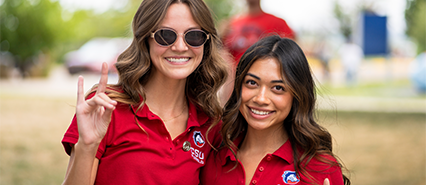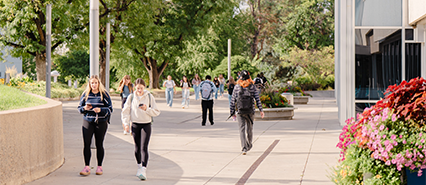Early Childhood Education, B.S.

Program Overview
The Early Childhood Education program at CSU Pueblo is focused on teaching children from birth through age 8. We offer two areas of emphasis: one with Director Qualification and one with K-3 licensure.
Students will acquire a strong foundation in child development and education through a combination of engaging courses and practical field work.
Individuals completing a B.S. in Early Childhood Education are required to complete a minor in education and meet all other requirements outlined by the School of Education.
The Education Minor allows students to pursue a Colorado teaching license in conjunction with their major.
Minor in Education"An integral component of the program is its partnerships with 17 school districts and four community colleges in southern and southeastern Colorado. The joint efforts of students, faculty, and administrators across all partners focus on improving the quality of learning in classrooms in elementary, secondary, and higher education."
- Jeff Piquette, Associate Dean
Frequently Asked Questions
-
What is the process for admission into the School of Education?
Even if you have been admitted to CSU Pueblo, you must go through a separate process to be admitted to the School of Education.
ED 301: Frameworks to Teaching is the course during which students complete the admission to education process at CSU-Pueblo. It can be taken when you have a cumulative GPA of 2.600 and successfully completed 45 college credit hours.
-
Are there education courses I can take before I am fully admitted into the School of Education?
ED 202: Foundations of Education is a perfect course that helps you learn more about the historical, philosophical, and sociological aspects of education as well as the opportunity to observe and tutor in local schools.
Also, students can enroll in ED 280: Educational Media and Technology, which prepares students to utilize instructional technology tools required in the School of Education.
-
What is the education portfolio?
A portfolio is simply a well-organized collection of items (lesson plans, student work, written reflections, video clips of teaching, etc.) selected to demonstrate a student’s expertise, experiences, and talents as a beginning teacher.
The Education Portfolio is used as part of the assessment process for admission into the Teacher Education Program during the ED 301 course, and later for admission and completion of Student Teaching. All portfolios will be created electronically on the Internet.
-
When and how should I get an advisor?
Early and consistent communication with faculty advisors is essential to successfully completing any college degree. All CSU Pueblo students will be assigned an advisor in their academic major.
It is important that you meet with your advisor each semester to appropriately plan out your courses and to stay aware of any extra requirements or changes in the program. Major advisors are assigned in the department of the major.
Students attending an SCTEA Partnership Community College (Pueblo Community College, Trinidad State Jr. College, Otero Jr. College, and Lamar Community College) should also meet with their advisor frequently to assure that the courses they are taking will transfer into the School of Education.
The faculty in the School of Education and at the community colleges have collaborated extensively to provide the best advising possible to make the transfer to CSU Pueblo as smooth as possible.
-
What are field experience and student teaching?
In order to provide students with opportunities to apply educational theory to practice, students spend approximately 200 hours in structured field experiences in K-12 schools as a part of their Professional Education courses.
In the final semester of the program, students engage in student teaching, where they work with a master teacher all day, every day for a minimum of 14 weeks.
By the completion of the teacher education program, students will have spent 800+ hours practicing in the actual classroom.
-
When should I take the praxis exam? How do I prepare?
The PRAXIS exam, which is required by the state of Colorado to license all teachers, must be successfully completed BEFORE you can student teach.
It is best to take it as soon as possible upon completion of courses in the major/teaching area, which is usually 1 or 2 semesters before student teaching.
-
Where can I find more information on specific classes I will take in this program?
The Course Catalog covers course requirements for prospective teachers. Elementary, secondary, and K-12 teaching minors also list all of the required courses and information about prerequisites.


